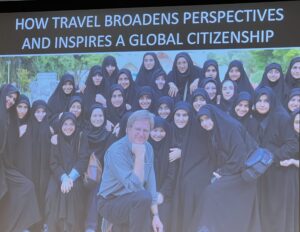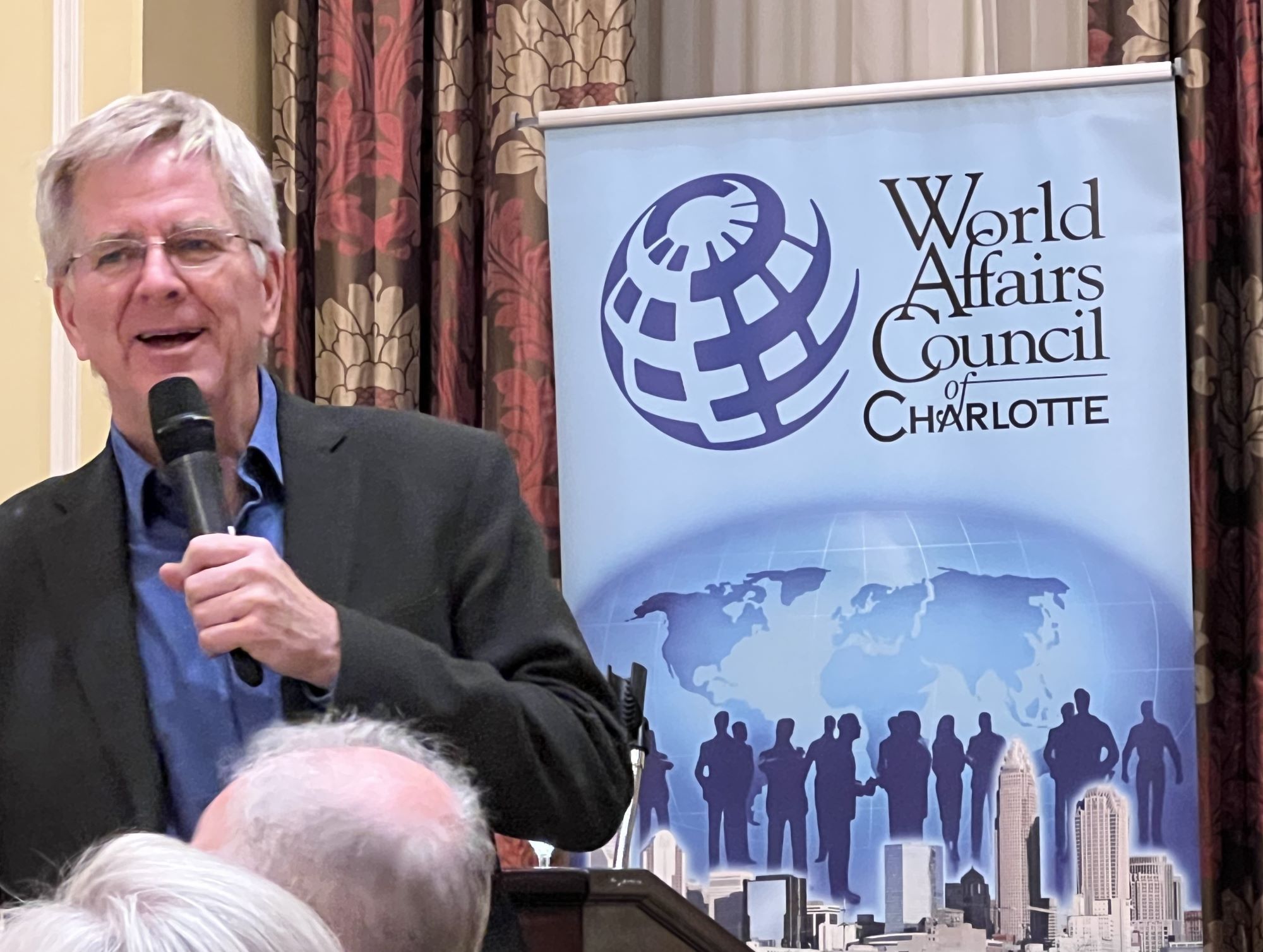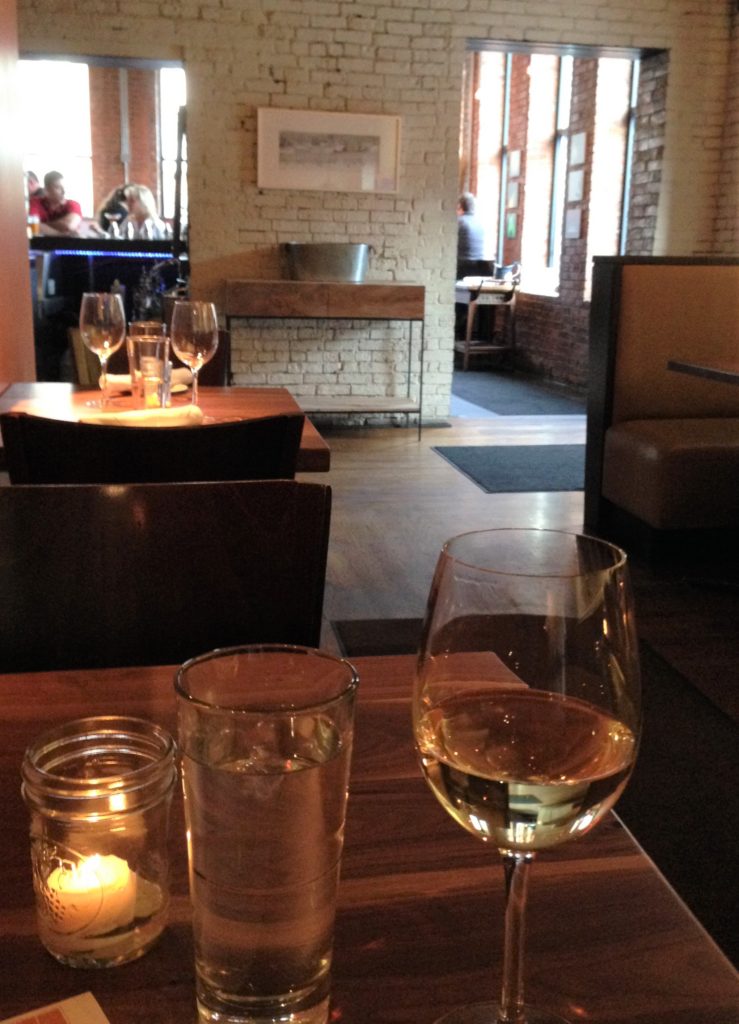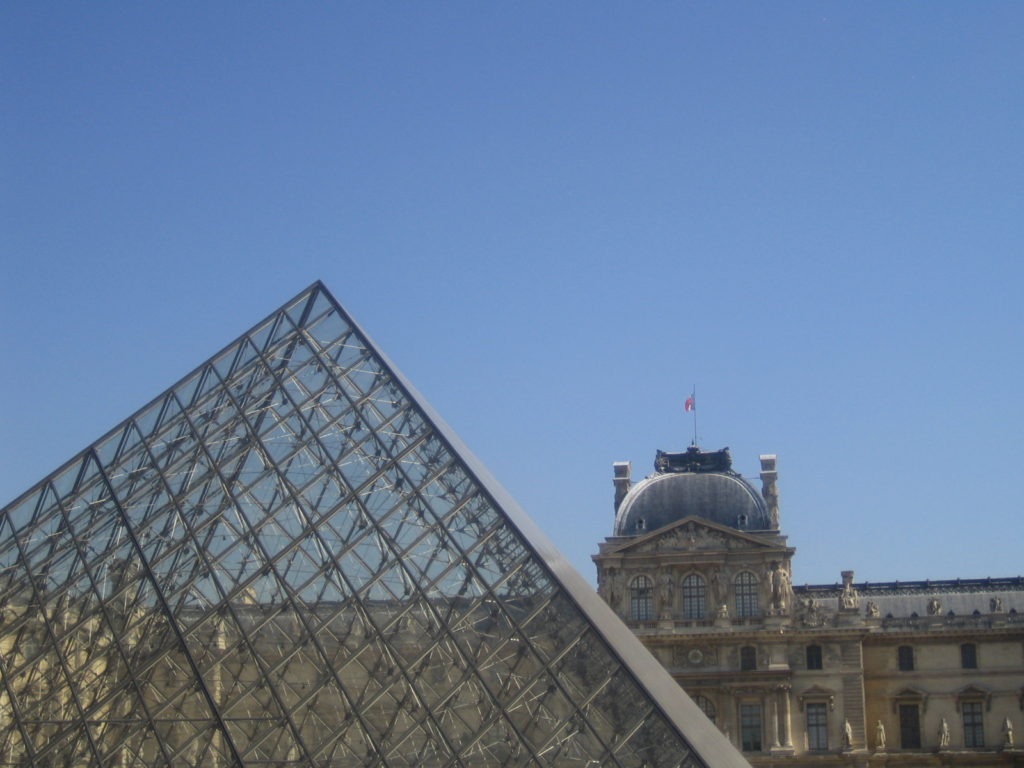“I’m a travel teacher,” Rick Steves, well-known to PBS fans, told two sold-out sessions sponsored by the World Affairs Council of Charlotte, NC this week. A self-described “conscientious traveler” who is “relentlessly curious” and believes in “soft power,” Steves is convinced that travel breaks down walls.
In today’s world, “if you are worried about safety, security and stability, you need bridges more than you need walls. When we travel, we build bridges,” while walls require a “dual narrative” (e.g., Israel and Palestine). “There are powerful forces who would be happier if people were just dumbed down…”
“As Thomas Jefferson said, ‘Travel makes a person wiser, if less happy.’”
 Steves has been traveling since he took his first trip – to Norway with his parents at age 14. He returns there often and says, “the coolest place in Oslo now is the Peace Bench.” The aluminum sculpture, a semi-circle shape that encourages people to sit side-by-side is named “The Best Weapon” after a quote by Nobel Peace Prize winner Nelson Mandela – “The most powerful weapon is talking to each other.”
Steves has been traveling since he took his first trip – to Norway with his parents at age 14. He returns there often and says, “the coolest place in Oslo now is the Peace Bench.” The aluminum sculpture, a semi-circle shape that encourages people to sit side-by-side is named “The Best Weapon” after a quote by Nobel Peace Prize winner Nelson Mandela – “The most powerful weapon is talking to each other.”
Now Steves, the “travel teacher” and PBS personality, travels 100 days a year, primarily in Europe, which he calls “the wading pool of the world.” He has written 80 books about Europe since 1980 and is attentive to constantly updating his travel guides. “I’m a hired hand of my readers, to be honest. I never keep a secret for myself. I like rustic and not too easy…where you can get away from the tourists.” It’s another eventful year for Steves, who is celebrating the 40th edition of his first book, Europe Through the Back Door.
A Cultural Chameleon
“There are three types of people – tourists, travelers (who learn and experience something new) and pilgrims (transformational travelers) …I’m still finding backdoors – cool, offbeat places. If advertising shapes your travel, you’ll never go to these places…The thing that distinguishes a trip is how many people have you met, how many preconceptions have you changed.”
Surprisingly, Steves says he speaks only English but uses the relationships he develops locally to experience a destination from the inside. “You can travel with the window up or the window down.” And in person he is remarkably candid. He establishes trust quickly, because he is a genuine enthusiast – almost “aw shucks” in his manner – and because he is in no way a walking-and-talking travel ad for a trip or product.
So it wasn’t terribly surprising when he said bluntly: “My mission is to equip and inspire Americans to venture beyond Orlando…La-la land versus reality.”
In Travel as a Political Act, published in 2021, Steves writes about travel has changed since 9/11. “Ideally, travel broadens our perspectives personally, culturally, and politically. Suddenly, the palette with which we paint the story of our lives has more colors. We realize there are exciting alternatives to the social and community norms that our less-traveled neighbors may never consider…You can travel to relax and have fun. You can travel to learn and broaden your perspective. Or, best of all, you can do both at once. Make a decision that on any trip you take, you’ll make a point to be open to new experiences, seek options that get you out of your comfort zone, and be a cultural chameleon – trying on new ways of looking at things and striving to become a ‘temporary local.’”
With that attitude, he says, “you’ll learn more, have more smiles, develop passions.” Steves encourages travelers to get into the mindset of the people, destination and history of each place visited. “The more understanding you bring to your sightseeing, the more you get out of it.”
He also travels “to eat” – “life is too short for mediocre ham in Spain.” In other words, don’t cut corners or budgets that dilute your experiences; rather, dive in deeply, experiment, be curious.
Selected Rick Steves’ Insights:
- “My favorite country in Europe is Italy.”
- “India is my favorite place to travel because it rearranges all my cultural furniture, my preconceptions.”
- When you get off the beach and go to the interior village a few blocks away, “you find small towns, perhaps less educated people, yet good people riddled by love.”
- “Half of humanity is trying to live on $5/day and 10 percent on $2/day – with dirt floors, no cement and no access to running water, education or healthcare.”
- “Hire a private guide in a poor country” as a way to get out and see the real place, and it’s “cost-effective” for navigating potentially difficult terrain or exploring with an insider lens.
- “I like travel agents – I like having an expert on my side.”
- His first grandchild is named “Atlas.”
- “You can see the impact of climate in your travel – floods, high tides, floodgates, storm surge barriers and where others are aggressively going green with transit – e.g., center cities with no traffic in favor of birdsongs and greenways.” In that vein, his company has an ethically motivated, self-imposed carbon tax, which adds $30 per individual. “It’s a climate smart initiative…that we give to nonprofits working with small farmers concerned with climate change.” He says it’s a promising way to “start paying for our travel as we go.”
Tips, Guides and Apps
If you’ve read any of Steves’ books, you know that he is fascinated by history and tries to educate readers about the cultural context of destinations they visit. His series Rick Steves’ Europe on PBS is loaded with free stuff, and his app has 60 free tours (“I’m your buddy”). By contrast, he argues, “the Travel Channel is not travel, but ads.”
His website is loaded with travel tips, videos, tours, blog articles and more – You can find several Rick Steves’ channels on Facebook and Instagram too.
The best advice I learned from Steves is to travel with only carryon luggage. “I never check a bag, and I go coach. I keep myself really busy on an airplane with noise-reducing earphones. Get used to a bag that is 9x22x14 inches. That’s tough love, baby, and you’ll be glad you did it!”
I am working on that! Meanwhile, these stress-reducing tips also espoused by Steves have guided me for years as a business and leisure Womantraveler:
- Leave with plenty of time in advance. Being early allows time for the unanticipated, and, believe me, there will be stressful situations for which time is your best friend.
- Do not book tight connections. While most airports are crowded and it’s not much fun to hang out, that extra hour or two allows you to navigate the unexpected, change plans if delays occur, shop for a last-minute travel necessity, make an emergency phone call when you realize you forgot something – and much more. And if all is going smoothly, open a book with a glass of wine and sit away from the crowds – or take advantage of some of the new, snazzy airport amenities that are popping up in many places. You’ll thank yourself afterwards.




